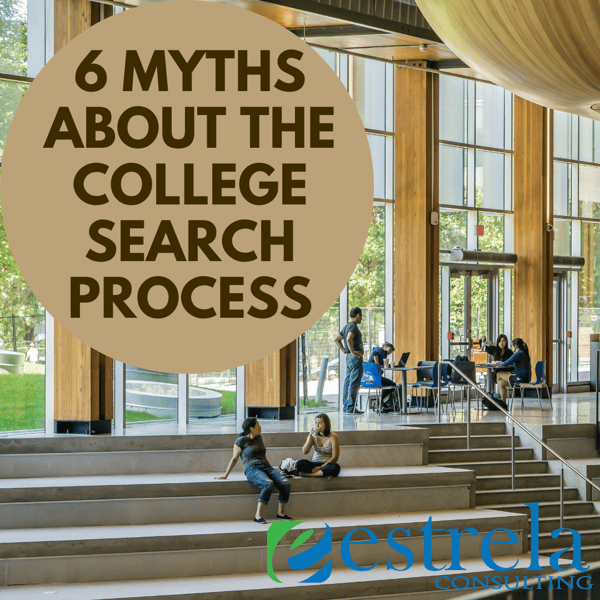
As students pack up their backpacks and begin their summer breaks, many will be shifting their focus to the beginnings of the college search process. Whether you are a rising sophomore just getting started, or a senior heading into the throes of starting the Common App, here are 6 college search myths to get out of your head this summer:
1. “I haven’t heard of that school…it must not be any good.”
With more than 4,000 colleges and universities in the U.S. alone, there is a good chance you will encounter schools whose names you’ve not heard before. Do you know anything about Eureka College? How about Ripon College? These are the alma maters of Ronald Reagan and Harrison Ford, respectively. We don’t think they did too bad in life. In fact one of our favorite books, Colleges That Change Lives, lists dozens of schools with names unknown to most…and all schools which do just as its title implies. Who wouldn’t want to attend a college that changes lives?
2. “I should take easier classes so I can get better grades to boost my GPA.”
Every college admission counselor will tell you that this strategy, while seemingly logical, isn’t the best way to exhibit your abilities. Sure, you can take Strength Training and get an A…but what about AP Biology with the possibility of getting a B? Which class do you think will showcase how you’ll perform when handed college-level assignments? Muscles may be great for improving your dating prospects but trust us, your professors won’t be challenging you to a pull-up contest any time soon…at least not for a grade. Most importantly, colleges want to see students taking courses that challenge them and where they can find success. Taking 4 AP courses and struggling to earn a C in each may not be the best strategy, but filling your schedule with "easy A" classes won't showcase your abilities, either.
3. “If I really love a college I should visit and call every chance I get to up my chances of admission!”
While “demonstrated interest” is a category used by many colleges in their holistic review of applicants, students should make campus visits purposeful and meaningful. Of course an official visit arranged through the Office of Admission is highly encouraged, but “drop ins” and attendance at EVERY Open House may come off as overly excited and pushy. The same goes for communication with the school...including that from parents. There is a difference between being interested and being bothersome, so limit calls and emails to genuine inquiries and follow-up. A tip for parents: let your teen take the lead on outreach to the colleges. Colleges appreciate when students take ownership of this process and show initiative and responsibility with communication.
4. “I have to know what I want to major in before I apply to college.”
While it’s true that some majors require that you indicate your intentions during the application process (Nursing and Engineering, for example), the vast majority of colleges allow students up until the end of their sophomore year to declare a major. This means that you have plenty of time to test the waters and take a few classes in the academic areas you think you’re headed towards before signing on the dotted line. In fact, a recent study by the U.S. Department of Education found that more than 1/3 of students changed their major after enrolling. So, don’t worry if you’re not sure what you want to be when you grow up…we’re still trying to decide that, too.
5. “My dad graduated from that college…I’m a shoo-in for admission!”
There is certainly some consideration taken for legacy candidates for admission but, we’re sorry to break it to you, there are never any guarantees. A frequently quoted article published in the Stanford alumni magazine sums up what many on the other side of the desk try to impress upon alumni families: legacy status is “only relevant if the student is competitive in all other aspects.” This means that if you aren’t a competitive applicant without your alumni connection, the likelihood that you’ll be receiving the fat envelope is probably slim. Remember that whole "Varsity Blues" scandal? It brought into the spotlight what's wrong with trying to game this system. So, parents: before you go agreeing to donate a building remember that your child should be seeking admission based on their merits, not yours. The school that was the best fit for you may not be right for your child. So, put away your checkbook, listen to your child, and encourage them along the way. The sense of pride they’ll have knowing they’ve been admitted to THEIR dream school will be worth it…trust us.
6. “My essay isn’t formal enough and I need to use bigger, fancier words.”
The essay is your chance to share your personality, creativity, sensitivity…basically all of the things that one couldn’t glean from your transcripts and test scores. Students should use their written voice to tell their story and be genuine. Some essays will make the reader laugh and others will cry. The reaction you don’t want to elicit is indifference. If, after reading your essay, the admission counselor has no additional feelings or insight into you as a person, you’ve just wasted 650 words. This is your chance to tell your story…make sure it’s a good one.


